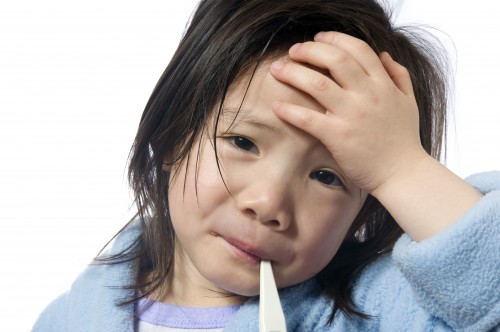Fever, headaches and tummy aches: when you should be concerned
What to do if your child complains of a headache, tummy ache or fever.
 Children can run, jump and play for hours and may not share complaints – particularly when their tummies, heads or knees hurt – until after the fun is over.
Children can run, jump and play for hours and may not share complaints – particularly when their tummies, heads or knees hurt – until after the fun is over.
One of the first things I like to know when ascertaining the seriousness of a child’s condition is whether the child is playing, smiling eating or drinking. If a complaint is brought up regularly, interferes with a play or a child really cries, parents should consult a physician.
High Fever
New parents might find the recommendations for when to seek treatment for a fever daunting, but it gets easier with time.
Children who are 3 months or older with fevers of 102 degrees Fahrenheit or higher that don’t respond to fever-reducing medicine should see a doctor.
Fevers up to 101 can often by managed with fever-reducing medicine, fluids and rest. However, if your child also has a harsh cough – which may indicate croup – you need to consult a doctor.
For infants 3 months and younger, any fever is serious and parents should see a physician’s help immediately. For children older than 3 months, a high fever combined with symptoms such as lethargy, changes in fluid and/or difficulty breathing require prompt medical attention.
Tummy Aches
If your child has a stomachache, there are three red flags that may warn parents of a serious illness such as appendicitis:
- Your child has a tummy ache and a fever.
- Your child can point with one finger to where it hurts.
- Your child has been vomiting.
Children don’t need to have all three symptoms for parents to see help because any one of these symptoms can indicate that appendicitis might be a possible diagnosis. Parents should also not wait too long. If symptoms worsen in six to eight hours, consult a doctor.
My Head Hurts
Headaches and even migraines can occur in children as young as 3 years of age. Parents can give their child a nonsteroidal anti-inflammatory medicine, such as ibuprofen, or eliminate headache pain caused by hunger, fatigue or dehydration with food, rest or fluids.
Talk to your pediatrician about his or her treatment recommendations, particularly if you’ve never treated your child’s headache before.
If headaches occur at the same time each day, parents should consult their pediatrician. Headaches can occur with the flu or fever, but we become concerned if a headache is serious enough to make a child cry, interferes with play or is so bad the child is vomiting.
Get to know Lanna McClain, M.D.
 I've been a pediatrician since 1996 and helped open the Cook Children's Physician Network Clinic in Burleson in 2010. I grew up in Odessa, Texas and obtained both my undergraduate and Medical Degree from Texas A&M University (WHOOP!). The best part of practicing pediatrics is seeing children grow from infancy to adulthood, and impacting that life positively! I have 2 college-age children, so I’m still working on the parenthood stuff, too! Outside of the office, I enjoy reading, yoga, playing the piano ( guitar, banjo and ukulele - too!) , and boating, fishing and paddle-boarding with my husband! New and existing Cook Children's Burleson pediatrician office patients can make an appointment by calling 817-447-445 or by clicking here.
I've been a pediatrician since 1996 and helped open the Cook Children's Physician Network Clinic in Burleson in 2010. I grew up in Odessa, Texas and obtained both my undergraduate and Medical Degree from Texas A&M University (WHOOP!). The best part of practicing pediatrics is seeing children grow from infancy to adulthood, and impacting that life positively! I have 2 college-age children, so I’m still working on the parenthood stuff, too! Outside of the office, I enjoy reading, yoga, playing the piano ( guitar, banjo and ukulele - too!) , and boating, fishing and paddle-boarding with my husband! New and existing Cook Children's Burleson pediatrician office patients can make an appointment by calling 817-447-445 or by clicking here.
